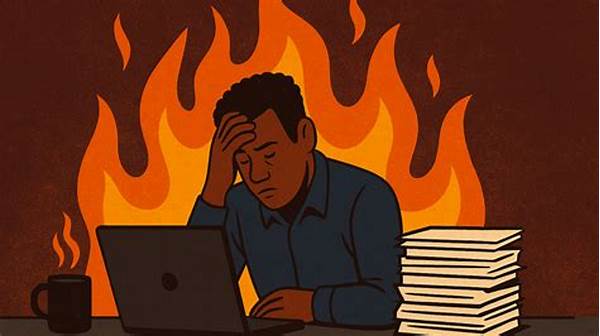In the heart of Southeast Asia, Indonesia is experiencing an alarming trend that’s raising eyebrows and sparking conversations across every board room, shared workspace, and coffee shop meeting. “Indonesia’s growing burnout crisis among young professionals” is not just a passing phrase; it’s a glaring reality that’s impacting the nation’s future torchbearers, our young professionals. A bustling economy and an enthusiastic young workforce are often seen as a recipe for success, but lurking beneath the surface is an overwhelming tide of burnout among these dynamic and ambitious individuals.
Read More : Why Saying No Is The First Stroke Against Burnout
How did we get here? The hustle mindset, while productive, has morphed into a double-edged sword. On one hand, it drives innovation and fast tracks career growth. On the other, it has silently paved the way to anxiety and stress. It is a story reiterated by countless young professionals who find themselves caught in a web of expectations, both external and self-imposed. The lack of work-life balance, coupled with the demanding nature of the digital age, has precipitated a fatigue crisis that’s getting harder to ignore.
Statistical data paints a stark picture of this issue. Recent studies show 57% of Indonesia’s millennial workforce experiences significant levels of stress and exhaustion, attributed largely to long working hours and inadequate work-life separation. This has led to a greater conversation about mental health in corporate settings — a dialogue that was long overdue in the conservative spaces of Indonesian workplace culture. Despite the tropical paradise settings, stress levels are alarmingly high, prompting businesses to rethink their approach to employee well-being.
The factors contributing to Indonesia’s growing burnout crisis among young professionals are multifaceted. First, there’s an intense pressure to succeed, fueled by societal expectations and the influence of family, which holds significant sway in Indonesian culture. Furthermore, the digital revolution, while bringing immense benefits, also adds a layer of complexity with its demand for constant connectivity and availability. As young professionals strive to maintain their competitive edge, the blurring lines between professional commitments and personal life become a breeding ground for burnout.
Another contributing element is the work culture that prioritizes visible dedication over productive results. In many workplaces, the commitment is equated with long hours rather than innovative solutions or efficient work methods. This kind of environment can often discourage young professionals from speaking out about the mental and emotional challenges they face, fearing that it may reflect poorly on their professional capabilities.
Navigating this challenging landscape calls for innovative solutions, not just from the individuals but from organizations and society at large. Embracing flexible work models, increasing mental health awareness, and fostering environments where employees feel comfortable discussing their struggles are essential steps toward mitigating the crisis. As Indonesia continues to grow and evolve, addressing these concerns is crucial, not just for the well-being of individuals but for the sustained economic and cultural vitality of the nation.
The Impact on Business Competitiveness
Burnout doesn’t just affect individuals — it carries heavy implications for businesses and the economy. With young professionals being the backbone of creative, innovative, and forward-thinking industries, their health directly influences productivity and overall business performance. Companies now face the critical challenge of retaining talent, as burnout can lead to increased turnover rates, absenteeism, and reduced job satisfaction.
It’s a call to action for businesses across all sectors to reassess their operational structures, prioritize employee well-being, and cultivate environments that support both professional growth and personal health.
Navigating the Path Forward
Addressing Indonesia’s growing burnout crisis among young professionals requires a collective effort across different strata of society. Organizations must prioritize education about burnout, ensuring that their staff is not only aware but also equipped to handle pressures constructively. Moreover, providing platforms for open dialogues about mental health can gradually dismantle the stigma associated with it.
In conclusion, while the crisis presents a formidable challenge, it also offers an opportunity for growth. By learning from their struggles, young professionals, employers, and policymakers can forge a path that not only alleviates the current strain but also fosters a culture of resilience and adaptability for future generations.
—
Six Insights Into Indonesia’s Growing Burnout Crisis Among Young Professionals
Recognizing the Symptoms
Burnout often sneaks up on young professionals until it reaches a boiling point. The symptoms manifest differently across individuals, ranging from physical exhaustion to emotional detachment. It’s about time we start paying attention to these signs, both within ourselves and our peers. Remember, acknowledging burnout is the first step toward recovery.
It’s time to shift the narrative from incessant hustle to mindful productivity. By fostering a supportive ecosystem where mental health is prioritized, not only will we see a decline in burnout cases, but a surge in creative and spirited work environments. So, what’s your take — are you ready to be part of the solution?
This comprehensive dialogue aims to serve as a call to action for those in leadership, human resources, and even at the peer level — let’s champion change, for a brighter, healthier workplace culture!
